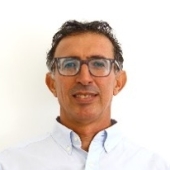About the speaker:
Marine biologist, graduate the Hebrew University of Jerusalem and formerly assistant professor at the University of Maryland. Study and develop land-based marine aquaculture systems for the sustainable and clean production of seaweed and other marine foods.
Company info:

Seakura was established in Israel in 2006, out of a powerful love of the sea and the environment, along with a desire to provide seaweed which is rich in nutritional elements including vitamins, minerals, protein, fatty acids, dietary fibers and antioxidants. This wish is expressed in the company name, composed of two words, "SEA" from the English, and "KURA", for treasure chest, in Japanese. Seakura’s team has developed unique patented (provisional) technologies for cultivating clean, organic and nutritious seaweeds (Ulva & Gracilaria) in land-based pools. This innovative method replaces the traditional method of harvesting seaweed from the open ocean, where it is exposed to pollutants of all kinds that result in small, unstable harvests of very low-quality seaweed. Morover, our seaweed cultivation method has no environmental impact and is fully ecologically sustainable since no chemicals are used during the cultivation process and the marine water returned back to the sea totally clean.
Our vision is to develop ecologically sustainable models for seaweed cultivation while assisting nature in maintaining the food chains and lifecycle of the sea.
Presentation:
Presenting Seakura land-based novel technology for clean and sustainable production of Seaweed of high nutritional value for human consumption and many other agricultural and industry uses.



